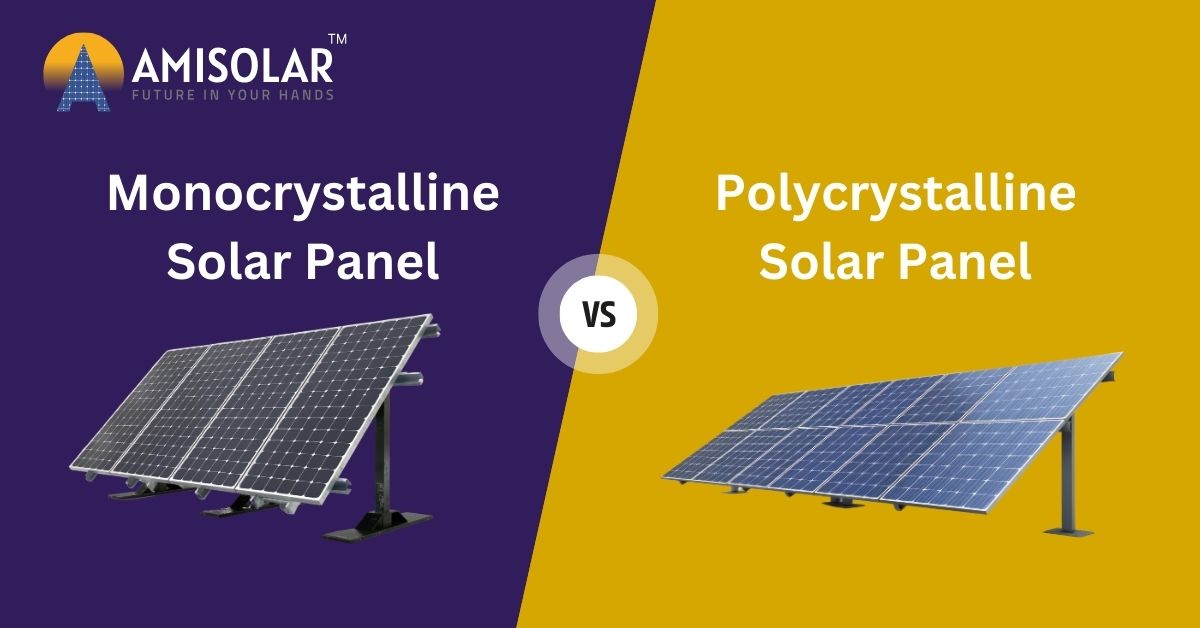Fostering Economic Growth and Opportunity Solar energy plays a crucial role in advancing sustainable development…

Choosing between mono and poly solar panels depends on various factors, including efficiency, cost, space availability, and personal preferences. Here’s a breakdown of both types to help you decide which is best for your needs.
What is Monocrystalline Solar Panel?
A monocrystalline solar panel is a type of solar panel made from a single crystal structure of silicon. This manufacturing process gives these panels their distinct characteristics, which are often associated with high efficiency and performance.
Advantages of Mono Solar Panels:
- Higher Efficiency: Mono panels typically have higher efficiency ratings (15-22%) compared to poly panels due to their higher purity silicon.
- Space-Efficient: They produce more power per square foot, making them ideal for smaller roofs or spaces with limited area.
- Longer Lifespan: Generally, mono panels have a longer lifespan and often come with better warranties (25 years or more).
- Aesthetics: They usually have a sleek black appearance, which some people find more visually appealing.
Disadvantages of Mono Solar Panels:
- Cost: Mono panels are usually more expensive than poly panels due to their manufacturing process.
- Performance in Heat: While they perform better in low-light conditions, they can experience a slight drop in efficiency in extremely high temperatures.
Interested in going solar? Contact us today to find the perfect solar panel solution for your needs!
What Is Polycrystalline Solar Panel?
A polycrystalline solar panel is a type of solar panel made from multiple silicon crystals. This manufacturing process gives polycrystalline panels their unique characteristics, making them a popular choice for many solar energy applications.
Advantages of Poly Solar Panels:
- Cost-Effective: Poly panels are generally less expensive to produce and purchase, making them a more budget-friendly option.
- Good Performance: They perform well in high temperatures and can be a good choice for regions with hot climates.
- Less Silicon Waste: The production process is less wasteful since it uses fragments of silicon rather than whole silicon crystals.
Disadvantages of Poly Solar Panels:
- Lower Efficiency: Poly panels typically have lower efficiency ratings (13-16%) compared to mono panels, which may require more space for installation.
- Aesthetic Appeal: They have a bluish hue and a less uniform appearance, which some may find less attractive.
Frequently Asked Questions
Why are polycrystalline solar panels better?
Polycrystalline solar panels are often more affordable than monocrystalline options, making them a budget-friendly choice. They perform well in hot climates and are less wasteful to produce, offering decent efficiency for larger installations.
What is the best solar panel?
The best solar panel depends on individual needs. Monocrystalline panels are highly efficient and have a longer lifespan, while polycrystalline panels are cost-effective and suitable for those with ample space.
Which solar panel is more powerful?
Monocrystalline solar panels are generally more powerful than polycrystalline panels, as they have higher efficiency ratings. This means they can produce more electricity per square foot, making them ideal for limited spaces.
What is the efficiency of mono vs poly?
Monocrystalline panels typically have efficiency ratings between 15% and 22%, while polycrystalline panels range from 13% to 16%. This indicates that monocrystalline panels generate more electricity in the same area compared to polycrystalline options.
Conclusion
In the debate between monocrystalline and polycrystalline solar panels, your choice should reflect your specific needs and circumstances. Monocrystalline solar panels stand out for their higher efficiency and space-saving benefits, making them ideal for limited roof areas. However, if you’re working within a budget and have ample space for installation, polycrystalline panels can provide a cost-effective solution without compromising too much on performance.
Ultimately, the choice between these two types of panels should also consider the reputation and reliability of the solar panel manufacturer. Investing in high-quality panels from a reputable manufacturer ensures better performance, efficiency, and longevity, leading to a more sustainable energy solution. Consulting with a solar energy expert can further guide you in selecting the right panels tailored to your unique energy needs, paving the way for a greener and more cost-effective future.


